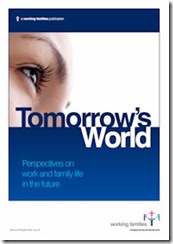I have been supporting the Working Families organisation for a number of years as a ‘Changemaker’ member. The mission of the organisation is so completely aligned with particularly the social benefits of Dynamic Work. The group “helps children, working parents and carers and their employers find a better balance between responsibilities at home and work.” Their latest publication is ‘Tomorrow’s World’ which takes a forward perspective on trends and directions in the industry to help firms prepare and adapt for the changing environment and challenges.
The publication also features a piece which I contributed titled “Top 10 Myths of Flexible Working”. I’ll feature one of the ‘myths’ here as a taster…
“Myth #4 – People abuse it to skive off.” Actually, in the flexible work environment the more pervasive problem that actually transpires is not people doing to little work, but actually doing too much – the ‘crackberry’ syndrome of not knowing when to turn off. While some eager managers might welcome this 24/7 productivity, it does require managing and tempering. It can be a simple problem to moderate with some coaching. One of the key changes to adopting flexible working is having a management-by-objective (MBO) culture. Look at more areas to manage performance based on outcomes and the ‘how’ of the work becomes much more versatile.”
I was discussing this particular myth with a several partners recently and they concurred with the upshot. One noted that there were poor performers who abused the system in the current conventional working environment and they just shift their tactics in a new, flexible environment. Another noted that it is not the environment or even the pretence of supervision or discipline that pre-empts abuse, but rather motivation. In the world of ‘knowledge’ work. At worst, someone can be sat at their desk all day watching YouTube (And if your IT department filters out the obvious websites, then they find others. And if the IT department switches off the Internet entirely, then it really is very difficult to do most professional jobs in this day and age). At best, someone can be staring at a screen and not thinking productive thoughts, but thinking about the footie, last night at the pub or whatever. The point is that just keeping an eye on someone sitting at a desk is a pretty outdated and ineffectual means of optimising productivity and effectiveness. Flexible work can be a catalyst to introducing not just enhancements to work life, but also enhancements to management effectiveness.

One thought on “Tomorrow’s Work”
Comments are closed.